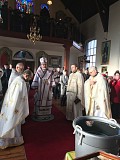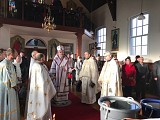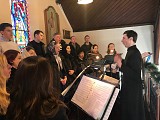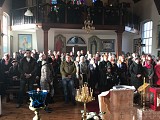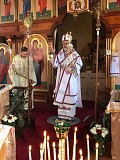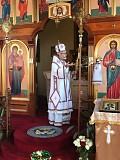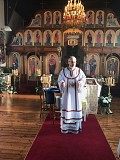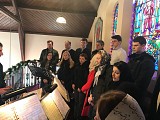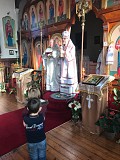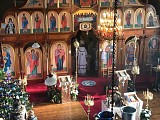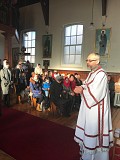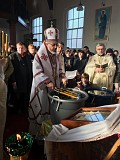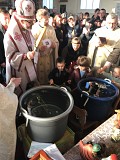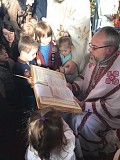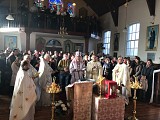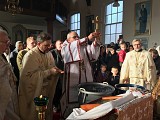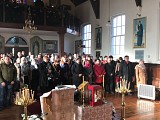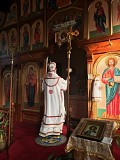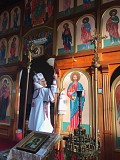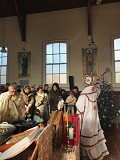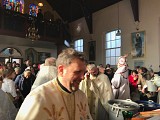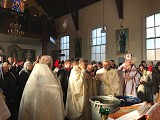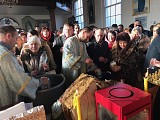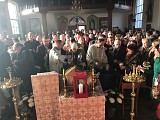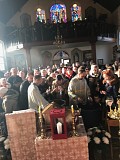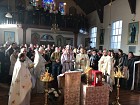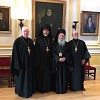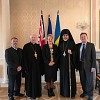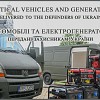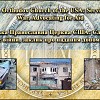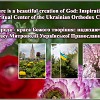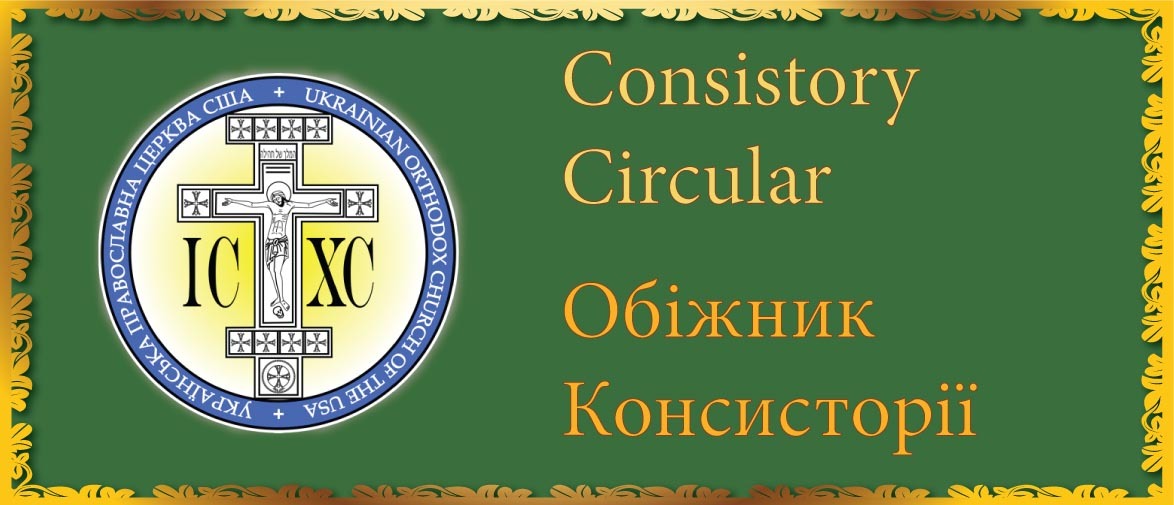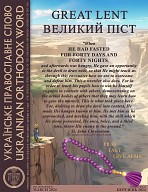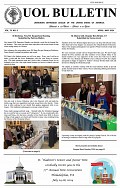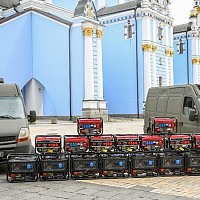The Feast of Theophany at Holy Transfiguration Ukrainian Orthodox Cathedral, London, Great Britain
"At Your Baptism in the Jordan, Lord, the Worship of the Trinity was Made Manifest...."
“Today earth and sea share the joy of the world, and the world has been filled with gladness.” (Prayer of Patriarch Sophronios of Jerusalem from the Great Blessing of Water on Epiphany.
On 19th of January we celebrate the Baptism of our Lord Jesus Christ in the River Jordan and the manifestation of His divinity when the Holy Spirit in the form of a dove descended on him. According to the Bible, when Christ was baptized: “he saw the Spirit of God descending like a dove, and alighting on him; and lo, a voice from heaven saying This is my beloved Son” (Matthew 3,17). The baptism of Jesus Christ is considered to reveal the Divinity of Jesus and reveals also the three Persons of the Holy Trinity.
Over 200 faithful and visitors of Holy Transfiguration Ukrainian Orthodox Cathedral in London, UK gathered at their parish temple to celebrate the feast day of Theophany of our Lord. His Eminence Archbishop-elect Daniel, a ruling hierarch of the Western European Eparchy of the Ukrainian Orthodox Church of Diaspora, led the services of the feast day.
In his sermon Vladyka Daniel reflected on the feast of Theophany, explaining to the faithful that Christ’s baptism in the Jordan was “theophany,” a manifestation of God to the world, because it was the beginning of our Lord’s public ministry. It was also a “theophany” in that the world was granted a revelation of the Holy Trinity. All three Persons were made manifest together: the Father testified from on high to the divine Sonship of Jesus; the Son received His Father’s testimony; and the Spirit was seen in the form of a dove, descending from the Father and resting upon the Son. The theme of “manifestation” or “revelation” is also expressed in Scripture with the symbolism of light. In the hymn of the Feast we sing, “Christ has appeared and enlightened the world.” Thus, January 19th is also known as the Feast of Lights. The Church celebrates on this day the illumination of the world by the light of Christ.
“We’re blessing the waters as a physical reminder of the responsibility we have to care for the earth,” said the hierarch. “Each year, we place a cross into the waters asking Jesus Christ to send down the Holy Spirit for the cleansing and sanctification of the water… The triple miracle which took place on this occasion — the opening of the heavens, the descent of the Holy Spirit in the form of a dove and the testimony of God the Father — completely convinced Saint John that Jesus Christ was the awaited Messiah. The visible descent of the Holy Spirit on the Messiah was exactly what Saint John was waiting for, because at the very beginning, when he was sent to preach as a prophet, God told him: "Upon whom you see the Spirit descending, and remaining on Him, this is He Who baptizes with the Holy Spirit." Consequently, from that moment John the Baptist could unmistakably and without the slightest doubt testify to all that Jesus is the Messiah and the Lamb of God that takes upon Himself the sins of the world. Soon after the Baptism of our Lord Jesus Christ, John sent some of his disciples to Him: the brothers Andrew (the First-called Apostle) and Peter and the brothers James and John (the Theologian). They joined Christ and became His first disciples and apostles… The Feast of the Theophany, or the Baptism of our Lord Jesus Christ, is, along with Pascha, one of the most ancient Christian holidays. It is dedicated to our Lord’s Baptism in the Jordan River. From ancient times Christians celebrated this feast day with great enthusiasm, because it reminded them of their own baptism and stirred them to a deeper consciousness of the power of this Mystery… As we celebrate today the baptism of our Lord Jesus Christ in the Jordan, let us thank God for the free gift of salvation through the grace of baptism. Let us also earnestly ask him for the grace to keep us faithful to our baptismal promises to say no to Satan and all his false promises and to say yes to God even unto death.”
Following the Divine Liturgy, the bishop, assisted by the clergy of the cathedral blessed the water. The Great Blessing of Water is perhaps the most memorable part of the Theophany services. Water, as a symbol of purification and cleansing connected explicitly with the blessing of the Jordan River, which occurred at the baptism of the Lord.
ХРЕЩЕННЯ ГОСПОДНЄ ТА БОЖЕСТВЕННА ЛІТУРГІЯ У КАФЕДРАЛЬНОМУ СОБОРІ
19 січня 2017 року, в день коли свята Православна Церква відзначає святе Богоявлення та Хрещення Господнє, у Лондонському Спасо-Преображенському кафедральному соборі було надзвичайно людно. Усі зібралися на молитву - святу Божественну літургію. За співслужіння духовенства собору богослужіння очолив Високопреосвященніший архієпископ-номінант Даниїл. Під час літургії були піднесенні молитви за мир в Україні. По закінченні святої Євхаристії відбувся уставний чин великого освячення води.
Звертаючись до мирян, архієпископ Даниїл привітав усіх зі святом, зазначив помічну та духовно-цілющу силу святої хрещенської води, закликав вірян свято шанувати та благоговійно відноситись, як до святині. Також Владика побажав богомольцям натхнення та сил, усіх щедрот від Бога та подякував за спільну єдність у молитві.
More about the meaning of the Great Blessing of the Water
The nineteenth of January is the feast of the Epiphany. Originally it was the one Christian feast of the “shining forth” of God to the world in the human form of Jesus of Nazareth. It included the celebration of Christ’s birth, the adoration of the Wisemen, and all of the childhood events of Christ such as his circumcision and presentation to the temple as well as his baptism by John in the Jordan.
Epiphany means shining forth or manifestation. The feast is often called, as it is in the Orthodox service books, Theophany, which means the shining forth and manifestation of God. The emphasis in the present day celebration is on the appearance of Jesus as the human Messiah of Israel and the divine Son of God, One of the Holy Trinity with the Father and the Holy Spirit.
The main feature of the feast of the Epiphany is the Great Blessing of Water. It begins with the singing of special hymns and the censing of the water which has been placed in the center of the church building. Surrounded by candles and flowers, this water stands for the beautiful world of God’s original creation and ultimate glorification by Christ in the Kingdom of God. Sometimes this service of blessing is done out of doors at a place where the water is flowing naturally.
The voice of the Lord cries over the waters, saying: Come all ye, receive the Spirit of wisdom, the Spirit of understanding, the Spirit of the fear of God, even Christ who is made manifest.
Today the nature of water is sanctified. Jordan is divided in two, and turns back the stream of its waters, beholding the Master being baptized.
As a man Thou didst come to that river, 0 Christ our King, and dost hasten O Good One, to receive the baptism of a servant at the hands of the Forerunner (John), because of our sins, 0 Lover of Man (Hymns of the Great Blessing of Waters).
Following are three readings from the Prophecy of Isaiah concerning the messianic age:
Let the thirsty wilderness be glad, let the desert rejoice, let it blossom as a rose, let it blossom abundantly, let everything rejoice … (Is 35: 1-10)
Go to that water, 0 you who thirst, and as many as have no money, let them eat and drink without price, both wine and fat … (Is 55:1-13)
With joy draw the water out of the wells of salvation. And in that day shall you say: Confess ye unto the Lord and call upon his Name; declare his glorious deeds… his Name is exalted … Hymn the Name of the Lord … Rejoice and exult … (Is 12:3.6).
After the epistle (1 Cor 1:10-14) and the gospel reading (Mk 1:9-11) the special great litany is chanted invoking the grace of the Holy Spirit upon the water and upon those who will partake of it. It ends with the great prayer of the cosmic glorification of God in which Christ is called upon to sanctify the water, and all men and all creation, by the manifestation of his saving and sanctifying divine presence by the indwelling of the Holy and Good and Life-creating Spirit.
As the troparion of the feast is sung, the celebrant immerses the Cross into the water three times and then proceeds to sprinkle the water in the four directions of the world. He then blesses the people and their homes with the sanctified water which stands for the salvation of all men and all creation which Christ has effected by his “epiphany” in the flesh for the life of the world.
Sometimes people think that the blessing of water and the practice of drinking it and sprinkling it over everyone and everything is a “paganism” which has falsely entered the Christian Church. We know, however, that this ritual was practiced by the People of God in the Old Testament, and that in the Christian Church it has a very special and important significance.
It is the faith of Christians that since the Son of God has taken human flesh and has been immersed in the streams of the Jordan, all matter is sanctified and made pure in him, purged of its death-dealing qualities inherited from the devil and the wickedness of men. In the Lord’s epiphany all creation becomes good again, indeed “very good,” the way that God himself made it and proclaimed it to be in the beginning when “the Spirit of God was moving over the face of the waters” (Gen 1:2) and when the “Breath of Life” was breathing in man and in everything that God made (Gen 1:30; 2:7).
The world and everything in it is indeed “very good” (Gen 1:31) and when it becomes polluted, corrupted and dead, God saves it once more by effecting the “new creation” in Christ, his divine Son and our Lord by the grace of the Holy Spirit (Gal 6:15). This is what is celebrated on Epiphany, particularly in the Great Blessing of Water. The consecration of the waters on this feast places the entire world — through its “prime element” of watering the perspective of the cosmic creation, sanctification, and glorification of the Kingdom of God in Christ arid the Spirit. It tells us that man and the world were indeed created and saved in order to be “filled with all the fullness of God” (Eph 3:19), the “fullness of him who fills all in all” (Eph 1:22). It tells us that Christ, in who in “the whole fulness of deity dwells bodily,” is and shall be truly “all, and in all” (Col 2:9, 3:11). It tells us as well that the “new heavens and the new earth” which God has promised through his prophets and apostles (Is 66:2; 2 Peter 3:13, Rev 21:1) are truly “with us” already now in the, mystery of Christ and his Church.
Thus, the sanctification and sprinkling of the Epiphany water is no pagan ritual. It is the expression of the most central fact of the Christian vision of man, his life and his world. It is the liturgical testimony that the vocation and destiny of creation is to be “filled with all the fullness of God” (Eph 3:19).
|
| |||||||||||||
